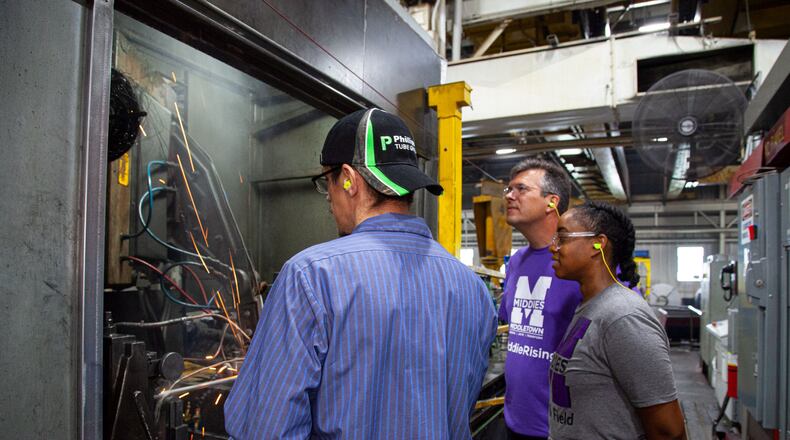Unlike the other proposals, the Butler Tech request was accompanied by letters of support from 33 others including local schools, businesses and other governments.
The proposal outlines future workforce predictions:
- 47% of U.S. jobs could be phased out in the future because of technological advances
- 65% of high school students are predicted to work in jobs that don’t yet exist
- 75% of the companies that are expected to be in the top 500 by 2027 haven’t yet been established
“It’s really a remarkable opportunity to be an economic catalyst for the county,” Butler Tech Superintendent/CEO Jon Graft told the Journal-News. “For years now people have been discussing the need for a viable, educated workforce and the demands from our businesses and industry partners continues to grow and continues to be strong. What Butler Tech has been facing is the ability for capacity to meet that need.”
The plan generally calls for a new facility at Middletown’s airport to teach innovations in the aviation industry and a location in Hamilton for advanced manufacturing career training, like 3-D printing and robotics, “to create a pipeline of a workforce to meet the needs of these industries,” Graft said.
The preliminary cost estimates are identical for each location, $7 million for a building; $2 million for equipment, $2 million for programming and $1 million in ongoing costs for a total of $24 million.
Carpenter said this project meets a key focus of the federal government in providing the ARP funding, which is to target disadvantaged communities.
“The Butler Tech proposals are the most crucial projects in the Rescue Plan proposals,” Carpenter said. “If we are able to fund those two projects, one in Hamilton and one in Middletown, it will make a difference for many generations ... It will allow us to create programs that will put young people on a path toward a career that will bring in a good income to their families and that’s the goal of the initiative to bring in two new campuses.”
The commissioners have not had a collective discussion on any of the proposals but all said the projects should have a long-term, broad-reaching benefit. A top priority is whether a project has a funding source for the long haul.
“I feel good about both of these projects I think they are a great use of federal relief dollars and I think they are long-lasting impacts for the economy in the region,” Graft said adding the ongoing costs would be incurred by Butler Tech.
This is the second request for money for projects in Middletown, the city has asked for $6.6. million to help transform and revitalize the Ohio 4 gateway to the city and the Oakland Neighborhood. City Manager Jim Palenick told the Journal-News they already partner with Butler Tech in expanding programming at Hook Field, so they are not competing for the commissioners’ money.
“Without question we think we have some really, really good transformative projects that are here in Middletown,” Palenick said. “Many of them are spearheaded by and projects of the city. In this particular case it is a Butler Tech project but it happens to be in the city, at our airport in partnership with the city. I think it points out that some of the best projects are where multiple partnerships come together.”
The commissioners cannot approve just any project they might like, projects must fall within the U.S. Treasury guidelines for the ARP funds. There are four very broad categories: mitigate the impact of the pandemic on households and businesses, non-profits and other industries; grant premium pay for essential workers, government or to employers dealing with the pandemic; revenue loss due to the pandemic and investments in water, sewer, or broadband infrastructure.
County Administrator Judi Boyko said none of the proposals have been fully vetted yet and there will be a team, including the county auditor and prosecutor, that will ensure all the federal guidelines are followed.
About the Author

